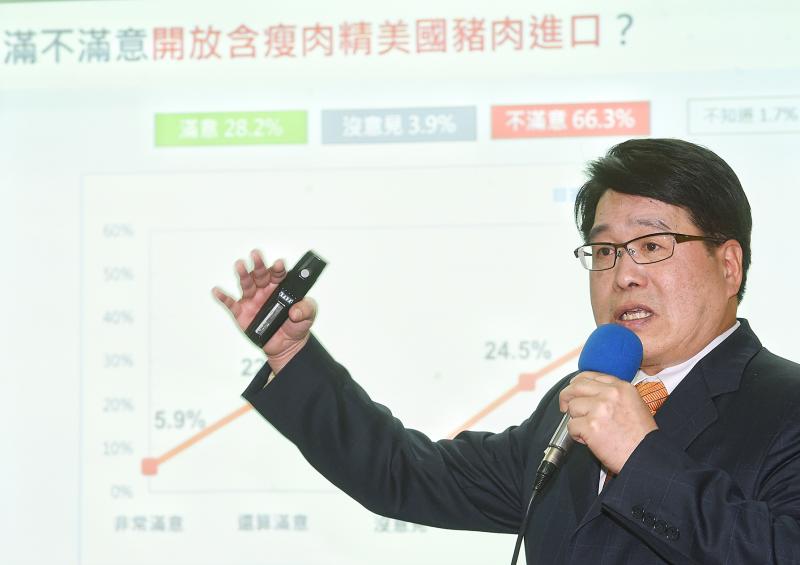The majority of people oppose imports of US meat containing ractopamine, but remain optimistic about Taiwan-US relations, survey results released yesterday by the Taiwanese Public Opinion Foundation found.
Foundation chairman Michael You (游盈隆) designed the questions, and commissioned Focus Survey Research to conduct the survey by telephone.
Respondents were asked about a variety of major issues, which also included Taiwan-China relations, and public approval of the president and premier.

Photo: Liu Hsin-de, Taipei Times
Of the respondents, 66.3 percent opposed imports of meat products containing ractopamine, while 28.2 percent approved, the foundation said.
However, the survey found that 60 percent of Democratic Progressive Party supporters approved of the imports, while 32 percent did not.
Among Chinese Nationalist Party (KMT) supporters, only 2.4 percent approved of the imports, and 97 percent opposed them.
Among the Taiwan People’s Party supporters who were surveyed, 15 percent approved of the imports and 85 percent disapproved, while 12 percent of New Power Party supporters approved and 79 percent disapproved.
Among those who had no political affiliation, 19 percent of respondents approved of the imports, while 74 percent opposed them.
The survey also found that 54.3 percent of respondents supported a referendum drive initiated by KMT lawmakers to reinstitute a ban on meat products containing ractopamine, while 36.1 percent did not.
Nearly all of the respondents aged 65 or under were in support of the referendum, while half of those above the age of 65 backed it, the foundation said.
Of the respondents, 51.3 percent said that they approved of how President Tsai Ing-wen (蔡英文) was dealing with major issues, while 37.4 percent said that they did not.
Regarding Premier Su Tseng-chang’s (蘇貞昌) overall performance, 52.3 percent said that they were happy with it, while 41.7 percent were dissatisfied.
Sixty-five percent of respondents said that they were not concerned that the relationship between Taiwan and the US would regress following the inauguration of US President Joe Biden, while 28 percent said they had such concerns.
On the issue of whether authorities should strive for Taiwan’s inclusion in the UN, 79 percent said that they should, while 15 percent said they should not.
Meanwhile, 67 percent of the respondents said they disagreed that the Taiwan-China relationship was more important than Taiwan’s relations with other countries, while 26 percent said that it was.
Of the 67 percent, 37 percent said that they “strongly disagreed,” while of the 26 percent, 12 percent “strongly agreed.”
Half of respondents supported formal Taiwanese independence, while 14 percent said that they hoped Taiwan would eventually be unified with China, and 25 percent hoped that the “status quo” would be maintained.
The survey, conducted on Monday and Tuesday last week, collected 1,081 valid questionnaires and had a margin of error of 2.98 percentage points.

The High Prosecutors’ Office yesterday withdrew an appeal against the acquittal of a former bank manager 22 years after his death, marking Taiwan’s first instance of prosecutors rendering posthumous justice to a wrongfully convicted defendant. Chu Ching-en (諸慶恩) — formerly a manager at the Taipei branch of BNP Paribas — was in 1999 accused by Weng Mao-chung (翁茂鍾), then-president of Chia Her Industrial Co, of forging a request for a fixed deposit of US$10 million by I-Hwa Industrial Co, a subsidiary of Chia Her, which was used as collateral. Chu was ruled not guilty in the first trial, but was found guilty

‘DENIAL DEFENSE’: The US would increase its military presence with uncrewed ships, and submarines, while boosting defense in the Indo-Pacific, a Pete Hegseth memo said The US is reorienting its military strategy to focus primarily on deterring a potential Chinese invasion of Taiwan, a memo signed by US Secretary of Defense Pete Hegseth showed. The memo also called on Taiwan to increase its defense spending. The document, known as the “Interim National Defense Strategic Guidance,” was distributed this month and detailed the national defense plans of US President Donald Trump’s administration, an article in the Washington Post said on Saturday. It outlines how the US can prepare for a potential war with China and defend itself from threats in the “near abroad,” including Greenland and the Panama

DEADLOCK: As the commission is unable to forum a quorum to review license renewal applications, the channel operators are not at fault and can air past their license date The National Communications Commission (NCC) yesterday said that the Public Television Service (PTS) and 36 other television and radio broadcasters could continue airing, despite the commission’s inability to meet a quorum to review their license renewal applications. The licenses of PTS and the other channels are set to expire between this month and June. The National Communications Commission Organization Act (國家通訊傳播委員會組織法) stipulates that the commission must meet the mandated quorum of four to hold a valid meeting. The seven-member commission currently has only three commissioners. “We have informed the channel operators of the progress we have made in reviewing their license renewal applications, and

A wild live dugong was found in Taiwan for the first time in 88 years, after it was accidentally caught by a fisher’s net on Tuesday in Yilan County’s Fenniaolin (粉鳥林). This is the first sighting of the species in Taiwan since 1937, having already been considered “extinct” in the country and considered as “vulnerable” by the International Union for Conservation of Nature. A fisher surnamed Chen (陳) went to Fenniaolin to collect the fish in his netting, but instead caught a 3m long, 500kg dugong. The fisher released the animal back into the wild, not realizing it was an endangered species at